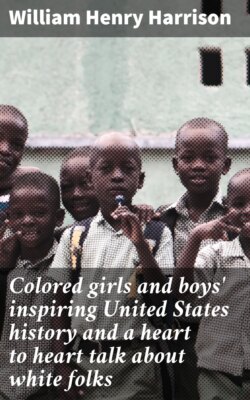Читать книгу Colored girls and boys' inspiring United States history and a heart to heart talk about white folks - William Henry Harrison - Страница 8
На сайте Литреса книга снята с продажи.
In the War of 1812
(1812)
ОглавлениеTable of Contents
There are few people who know that one of the main causes of The War of 1812 was on account of the British forcibly taking and compelling three Americans (two Negroes and one Caucasian) to sail under the English flag. It was in that same war that a Colored soldier, Jefferys, on seeing a body of American troops retreating under heavy fires from the enemy, dashed to their front, rallied them together, led their steps back and repelled the British soldiers who were about to break through a very important but weak point in General Jackson’s defense at Mobile. That general not only noted that leadership rally but gave full credit and praise where it was due. He also expressed gratefulness to the soldier of color whose ideas first suggested the successful use of bales of cotton for breastworks in fortifications. In the battles around New Orleans he looked with soldierly pride upon the splendid fighting of his black troops.
When American school children learn from their United States histories that clean-cut and famous naval battle report, “We have met the enemy and they are ours” ..., such histories do not also inform their readers that the personal pronouns “we” and “ours” so prominent in Commodore Perry’s above message includes the heroic deeds of Colored sailors as well as white. So when in reciting these stirring words their iron-charged bloods suddenly gallop through their veins; their chests expand wide with national pride; their heads jerk erect with proud fighting spirits and their eyes sparkle bright with slumbering fires, such patriotic emotions have been unknowingly and involuntarily aroused in true American youths because of the loss of Colored blood and lives as well as of white in those lake battles. And among those weather-beaten bronze “salts” were Jack Johnson (not our present ex-champion heavyweight prize fighter of the world) and John Davis who were both especially mentioned for distinguished service on the schooner, “George Thompson.” That world known message of 1812 also included many other Negro sailors who pitted their bravery and brawn against the British “tars” in order to help Commodore Oliver Hazard Perry to break the backbone of the War of 1812 by opening up a clear passage on the Great Lakes. It was through that same newly made water path that General William Henry Harrison (the hero of Tippicanoe, Log Cabin and Hard Cider) and his seasoned famed Indian fighters were conveyed in order to enter Canada where they completely defeated the artful Proctor and slew the cunning Tecumseh in that savagely fought battle of The Thames. Thus Colored fighters helped to end the foxy and wolfish Proctor-Tecumseh partnership that had annoyed and tormented for so long the American settlers on the Northern frontiers.
